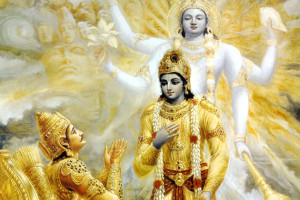Perform work in this world, Arjuna, as a man established within himself – without selfish attachments, and alike in success and defeat. For yoga is perfect evenness of mind. -Krishna
 – Krishna was an earhtly prince who did many practical things to help the people of his time, but was always established in Self-Realization through yoga meditation.
– Krishna was an earhtly prince who did many practical things to help the people of his time, but was always established in Self-Realization through yoga meditation.
Intorduction
In periods of seated meditation, there are states of great peace and great turmoil that pass through the mind in oscillating intervals. As with the personal, so the collective: as human civilization evolves, periods of relative peace are often followed by chaotic times that require protest and dedicated work on behalf of the oppressed. As current events unfold, it appears we are entering a period marked by increasing ignorance, injustice, and even impending catastrophe: nationalist politics threaten to deprive the rights of minorities; terrorism strikes fear into the hearts of decent people worldwide; climate change even threatens to destroy the world as we know it.
Any rational person understands that mere prayers and a “spiritual” perspective are not enough. When people are hungry, they must be fed. When laws are unjust, they must be protested. When leaders concoct schemes to defraud the innocent, we must fight nonviolently to thwart their plans. In short, all sorts of practical work must be done to improve the world, and every person has their own particular work to do.
To realize God is not to deny the obvious suffering in the world, but to have a different perspective on it. While we do our work, we can simultaneously understand that the physical world, with all its seeming madness, is not the only Reality. The sages and mystics of many religions tell us that our life is like a dream, and that whatever happens in the dream ultimately has no effect on the Dreamer, our True Nature. Everything we see in the physical world of matter is like the waves on the ocean. The waves are sometimes peaceful, and sometimes raging in terrifying storms. Yet whatever happens on the surface, the depths of the Sea remain at peace. A sage is a person who works on the surface for the welfare of the world, but is simultaneously in touch with the depths. Perhaps a better way to say it is that a sage is someone who sees that the waves and the depths are, in reality, one and the same.
 – Krishna revealing to Arjuna the timeless Way of the Yogis.
– Krishna revealing to Arjuna the timeless Way of the Yogis.